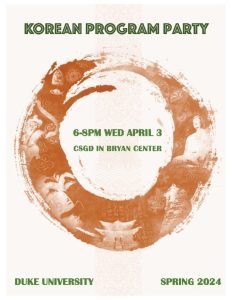This blog post was written by Miree Ku, Korean Studies Librarian, Duke University Libraries
This fall semester, the first library session in Korean Studies at Duke was held on September 13 with Advanced Korean class students. It focused on resources related to Korean culinary culture and folk narratives from historical and transnational perspectives. After a brief introduction to Korean resources, we dove into the shelves for a fun, treasure hunt-like search for books. We explored novels, photo books, comic books, and more on the topics we were seeking. Some students speak Korean, but they still need advanced language skills to fully grasp Korean culture. While each student has a different level of proficiency, they all share a deep appreciation for Korean culture.

I have noticed some significant changes in the students over the last 18 years of conducting library classes. In the past, Duke’s Korean language classes were mostly attended by students with a biological connection to Korea, whether through themselves, their parents, or their grandparents. These days, more students without such backgrounds are enrolling, primarily because of their interest in or love for Korean culture, including its music, films, dramas, webtoons, food, and more. Their knowledge and language abilities truly surprise me.
My personal impressions are confirmed by recent reports about student enrollment in Korean language classes in U.S. colleges. For example, a report from Modern Language Association noted that, while overall enrollment in language classes has plateaued in recent years, U.S. college student enrollment in Korean language classes rose by 78% from 2009 to 2016, reaching 15,000. According to the most recent MLA report on ‘Enrollments in Languages Other Than English in United States Institutions of Higher Education’, released in November 2023, the comprehensive nationwide census reveals that Korean was one of only three languages that witnessed an increase in student enrollment (the others being American Sign Language and Biblical Hebrew). And a 2022 report from NPR news found that interest in Korean popular culture has skyrocketed over the past decade due to the popularity of such K-Pop favorites as ‘Gangnam Style‘ and BTS, as well as South Korea’s successes in film and TV, such as Parasite and Squid Game.
As Korean culture has been spreading globally through popular music, entertainment, TV dramas, and movies, it has also sparked a boom in Korean language learning at universities worldwide, including here at Duke. The Korean Language program at Duke University continues to evolve and change to meet the demand of students. Korean language courses range from Elementary to Advanced Korean to Issues in Korean Language and Society, Korean Politics and Society, and Korean for Graduate Students. The university also provides courses related to Korean culture, literature and history such as Korean Popular Music (K-pop), Korea in Performance: Global Culture and Soft Power, World of Korean Cinema, Two Koreas: History, Society and Culture, Korean Sociolinguistics, Migration and Human Rights in Korea: Local and Global Perspectives, and more.
Here’s another indicator of local interest in Korean studies: for the 2023–2024 academic year, the Duke Graduate School awarded 65 Dean’s Research Awards for Master’s Students. Each award provides up to $1,000 to support a master’s student’s research and professional development. One of recipients was EAS-MA ’24 candidate Seulbin Han, who received the 2023–24 Dean’s Research Award for Master’s Students.

Han received this award to support a research project focused on analyzing the global success of Korean popular music, or K-Pop, with an emphasis on the phenomenon’s consumers. The success of K-Pop in recent years has not only drawn increased attention to the Korean music industry but has also contributed to the rapid expansion of South Korea’s economic, social, and cultural ‘soft power’ across unconventional boundaries. According to her project description, Han’s research explores whether diasporic consumers of K-Pop in the United States play a significant role in bringing global attention to K-Pop as a profitable music industry.
Han became interested in studying diasporic consumers of K-Pop and Korean culture because the influence of K-culture has expanded to non-Korean speakers. As I have observed through Duke’s Korean Studies programs, in the past, Korean language courses were primarily made up of heritage speakers looking to deepen their knowledge of Korean culture. However, with the rise of K-pop as a global phenomenon, these programs are now growing largely due to the enrollment of non-Koreans. As a result, Korean language programs are increasingly attracting non-Korean speakers who want to learn the language, culture, history, and more.
Once a semester, the Korean Studies Program at Duke University holds a ‘Korean Program Party,’ where all students taking Korean program classes come together to share the projects they’ve worked on in class, learn about the special programs offered by the Korean department, and enjoy fun Korean games, music, and dance performances by talented students. We also share delicious Korean food, sponsored by the Korean program and faculty.
This spring, the Korean Program Party was held on April 3, 2024. Every time I attend, I realize how much the students enjoy Korean culture and language through Duke’s Korean program. We always have a fun and joyful time together. I’m really looking forward to meeting new students in the Korean studies program and attending this fall’s Korean Program Party, which will be held on October 23, 2024.
Come party with us!



